Bad breath, medically called halitosis, can result from poor dental health habits and may be a sign of other health problems. Bad breath can also be made worse by the types of foods you eat and other unhealthy lifestyle habits. You can take steps to prevent and treat halitosis, at home and with the help of your dentist or doctor.
Definition
Halitosis, generally known as bad odor, may be awkward and, in extreme situations, can make people nervous. It makes sense that there are so many gum, mint, mouthwash, and other items meant to combat foul breath on store shelves. But because they don’t deal with the root of the issue, many of these items are merely band-aid fixes.
Among the factors contributing to foul breath are certain meals, medical problems, and behaviors. With continuous, good oral hygiene, you can often reduce foul breath. If straightforward self-care methods are ineffective, consult a dentist or doctor to make sure a more serious disease isn’t to blame for your foul breath.
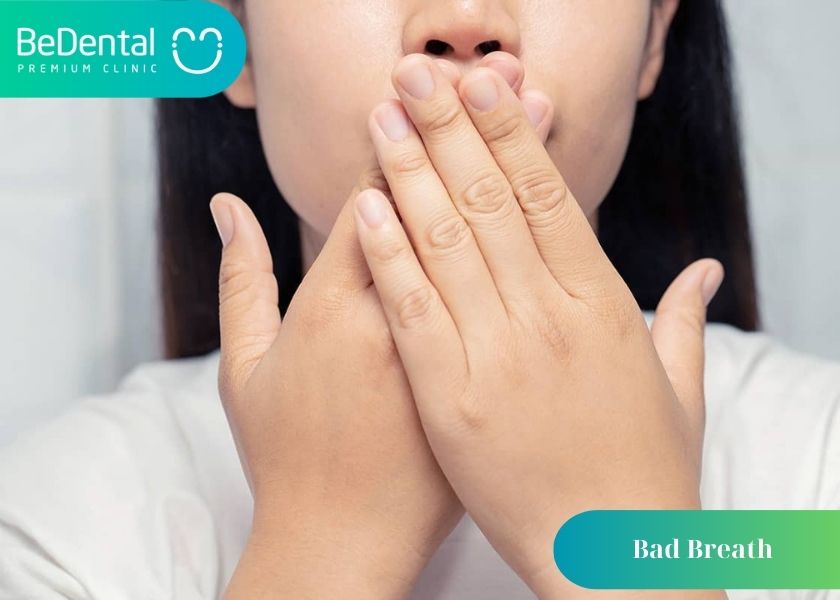
Symptoms of bad breath
Bad breath odors vary, depending on the source or the underlying cause. Some people worry too much about their breath even though they have little or no mouth odor, while others have bad breath and don’t know it. Because it’s difficult to assess how your own breath smells, ask a close friend or relative to confirm your bad-breath questions.
Review your oral hygiene routines if you have poor breath. Consider adopting lifestyle adjustments including drinking lots of water, using dental floss, and cleaning your teeth and tongue after meals.
Consult your dentist if your foul breath still exists after making these modifications. Your dentist could suggest that you see a doctor to identify the source of the odor if they think that your foul breath is the result of a more serious disease.
Causes
Most cases of poor odor occur in the mouth, and there are several potential reasons. They are:
- Food. Bacteria growth and bad odors can result from food particles breaking down in and around your teeth. Foods like onions, garlic, and spices can all contribute to nasty breath. After these items have been digested, they enter your circulation, flow to your lungs, and have an impact on your breathing.
- Tobacco products. Smoking leaves a bad aftertaste in the mouth. Gum disease, another cause of bad breath, is more prevalent among smokers and tobacco users.
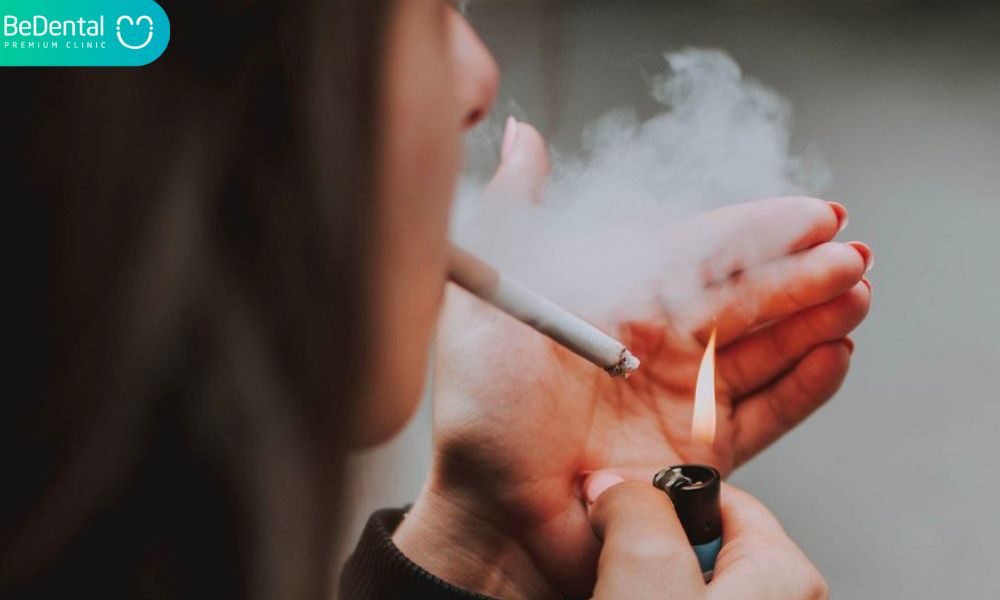
- Poor dental hygiene. Food particles that aren’t removed from the mouth with frequent brushing and flossing might lead to foul breath. Plaque, a sticky, white coating of germs, develops on your teeth. If plaque is not removed, it can irritate your gums and eventually cause pockets of plaque to grow between your teeth and gums (periodontitis). The germs that cause smells can also be caught on your tongue. Food particles and odor-causing germs can accumulate on dentures that aren’t cleaned often or don’t fit well.
- Dry mouth. Your mouth is cleaned by saliva, which also gets rid of bad-smelling particles. Due to reduced saliva production, a condition known as dry mouth, also known as xerostomia, can induce bad breath. Sleeping with your mouth open makes dry mouth, which naturally causes “morning breath,” worse. An issue with your salivary glands and a few disorders can also contribute to chronic dry mouth.

- Medications. By causing dry mouth, several drugs might unintentionally cause bad breath. Other substances can be broken down within the body to release compounds that are then exhaled.
- Infections in your mouth. Bad breath may develop from dental decay, gum disease, mouth sores, surgical wounds following oral surgery, such as tooth removal.
- Other mouth, nose and throat conditions. Sometimes, tiny stones that develop in the tonsils and are coated with odor-producing bacteria might cause bad breath. In addition to contributing to postnasal drip, infections or persistent inflammation in the nose, sinuses, or throat can also result in poor breath.
- Other causes. Chemicals produced by illnesses like certain malignancies and ailments like metabolic disorders can give people a particular breath odor. Bad breath may be a symptom of gastroesophageal reflux disease (GERD), which is a chronic reflux of stomach acids. A foreign object, such as a piece of food, being stuck in a child’s nose might result in bad breath.
Diagnosis
Your dentist will probably smell your nasal breath as well as your mouth breath and grade the odor on a scale. Your dentist may also scrape the back of the tongue and grade its odor because this is where the smell most frequently originated.
The compounds that cause bad breath may be found using sophisticated detectors, albeit they aren’t always accessible.
Treatment
These suggestions might be helpful if you want to your bad breath in office:
- In order to lessen the possibility that things you eat during the day may interfere with the exam, dentists typically prefer early visits for bad breath examinations.
- To avoid masking any scents, avoid wearing perfume, scented lotions, scented lipstick, or scented lip gloss to your visit.
- Ask your dentist whether your visit has to be changed if you’ve taken antibiotics within the past month.
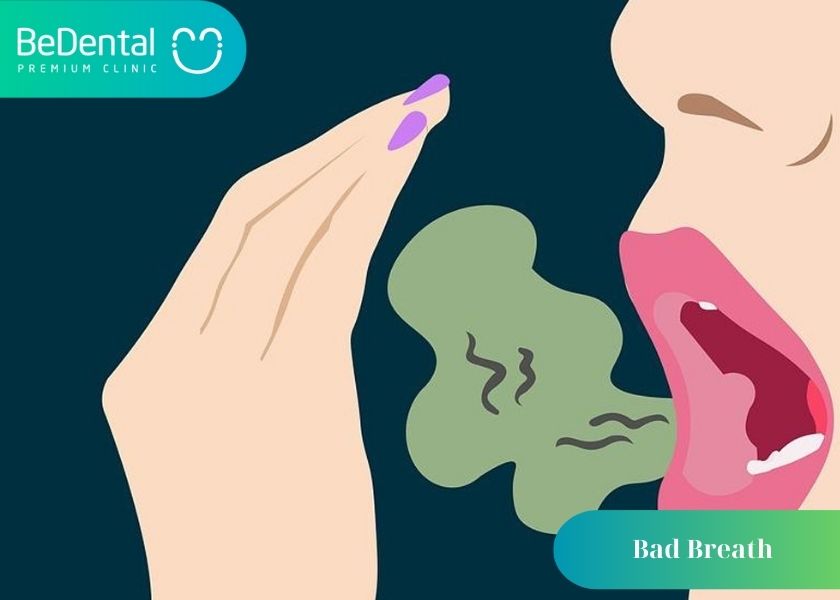
Consistently maintain appropriate dental hygiene to lessen bad breath, assist prevent cavities, and minimize your chance of developing gum disease. Depending on the reason, further therapy for foul breath may take many forms. Your dentist will probably recommend that you see your primary care physician if it is determined that the source of your bad breath is an underlying medical problem.
Your dentist will consult with you to help you better manage conditions caused by oral health issues. dental precautions might include:
- Mouth rinses and toothpastes. A mouthwash that kills germs may be suggested by your dentist if the cause of your foul breath is a plaque buildup on your teeth. To combat the germs that lead to plaque formation, your dentist may also suggest a toothpaste that has an antibacterial component.
- Treatment of dental disease. A gum specialist could be recommended to you if you have gum disease (periodontist). Gum disease can cause your gums to move away from your teeth, leaving behind large pockets that overflow with germs that produce bad odors. Sometimes, harmful germs may only be eliminated by expert cleaning. Additionally, since damaged dental restorations are a haven for bacteria, your dentist can advise replacing them.
Dental routine
To lessen or stop bad breath:
- Brush your teeth after you eat. To use after eating, keep a toothbrush at work. At least two times every day, especially just after meals, you should brush with a fluoride-containing toothpaste. Bad breath smells have been demonstrated to be reduced by toothpaste having antibacterial capabilities.
- Floss at least once a day. By properly flossing, you can reduce bad breath by removing food particles and plaque from in between your teeth.
- Brush your tongue. Because your tongue contains microorganisms, gently brushing it may help to cover smells. A tongue scraper may be helpful for those whose tongues are coated due to a severe bacterial overgrowth (caused, for instance, by smoking or dry mouth). You may also use a toothbrush with a built-in tongue cleaning.
- Clean dentures or dental appliances. If you have a bridge or denture, make sure to clean it completely at least once a day or as recommended by your dentist. If you use a mouth guard, clean it every time before putting it in your mouth. The ideal cleaning solution can be recommended by your dentist.
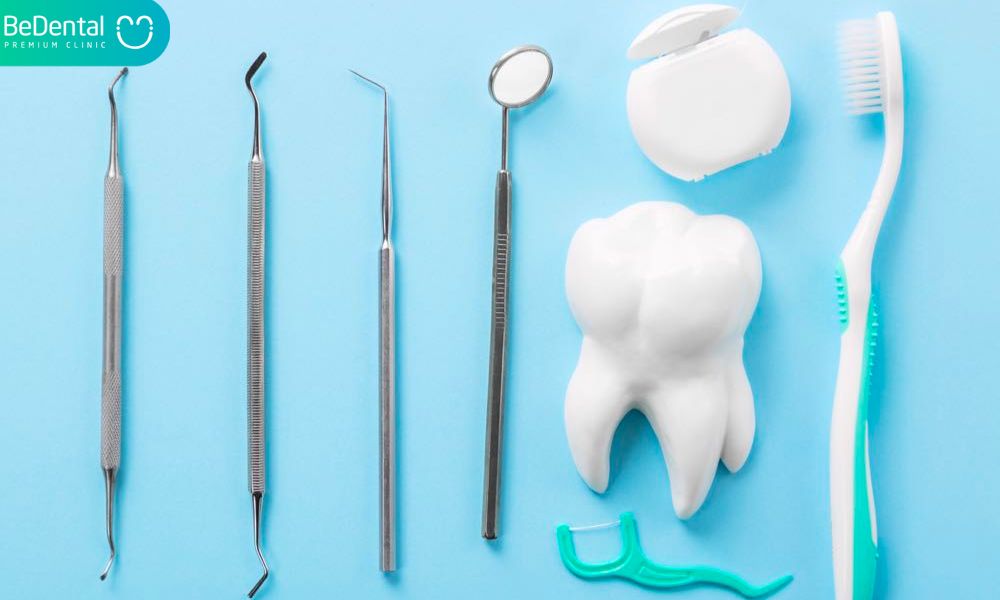
- Avoid dry mouth. Avoid using cigarettes, and consume lots of water instead of coffee, soft drinks, or alcohol, which might cause your mouth to become drier. To boost salivation, chew gum or suck on candy—preferably sugar-free. Your dentist or doctor may recommend an oral saliva-stimulating medicine or preparation of artificial saliva to treat persistent dry mouth.
- Adjust your diet. Eat less of the items that might make you breath terrible, such as onions and garlic. Additionally connected to poor breath is eating a lot of sweet meals.
- Regularly get a new toothbrush. Replace your toothbrush every three to bad months, or when it becomes worn, and go for a soft-bristled one.
- Schedule regular dental checkups. To have your teeth or dentures tested and cleaned, see your dentist frequently – typically twice a year.
Q&A
What causes horrible smelling breath?
Bacteria that produce odors and multiply in the mouth are what create bad breath. Bacteria grow on food particles left in your mouth and between your teeth when you don’t routinely brush and floss. Your breath smells because these bacteria emit sulfur compounds.
Can bad breath come from the stomach?
When stomach acid rushes up into the esophagus, persistent acid reflux results. Because stomach acid erodes tooth enamel, it can also result in the fissures that trap food. This displaced stomach acid may also be the source of bad breath.
Why does my mouth smell even after brushing?
Bad breath may result from mouth infections. The source of your bad breath, however, may be something else, such as sinus ailment, stomach reflux, diabetes, liver illness, or renal disease, if your dentist has ruled out other possibilities and you brush and floss every day. Consult a medical professional in this situation.
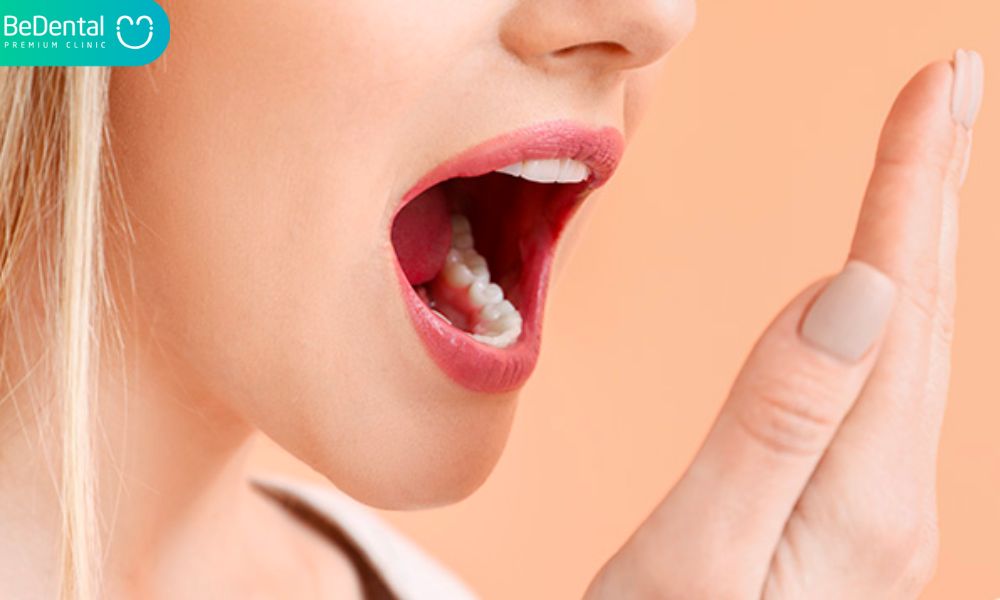
Can bad breath go away by itself?
The medical term for unpleasant breath is halitosis. When you first wake up, unpleasant breath is typical. Normally, it goes away when you drink something and brush your teeth. The persistence of bad breath may indicate the presence of another illness.
Can you smell your own breath?
You should be able to detect the smell of your breath by licking your wrist, letting it dry for a while, and then taking a sniff. The floss can also be smelled after you have flossed at the rear of your mouth. Alternately, gently scrape your tongue with a tongue scraper or a toothbrush with soft bristles. Then, smell the scraper.
Will bad breath ever go away?
Treating the underlying issue usually helps most individuals get rid of persistent halitosis. Changing your dental hygiene practice might be as easy as that. Finding a treatment that works for you may take some trial and error if your persistent bad breath is caused by a medical issue.
See more
Porcelain Veneers and 3 factors influence the price of Porcelain Veneers
Tooth extraction and 7 common concerns
How to Handle 3 Types Of Dental Emergencies While Working Abroad
Bleeding gums and 9 ways to cure at home
Tư vấn chuyên môn bài viết:
BÁC SĨ ĐÀM TRỌNG HIẾU






Pingback: Cost of Zirconia crowns/veneers: Ranging between $800 and $1,500. – Be Dental